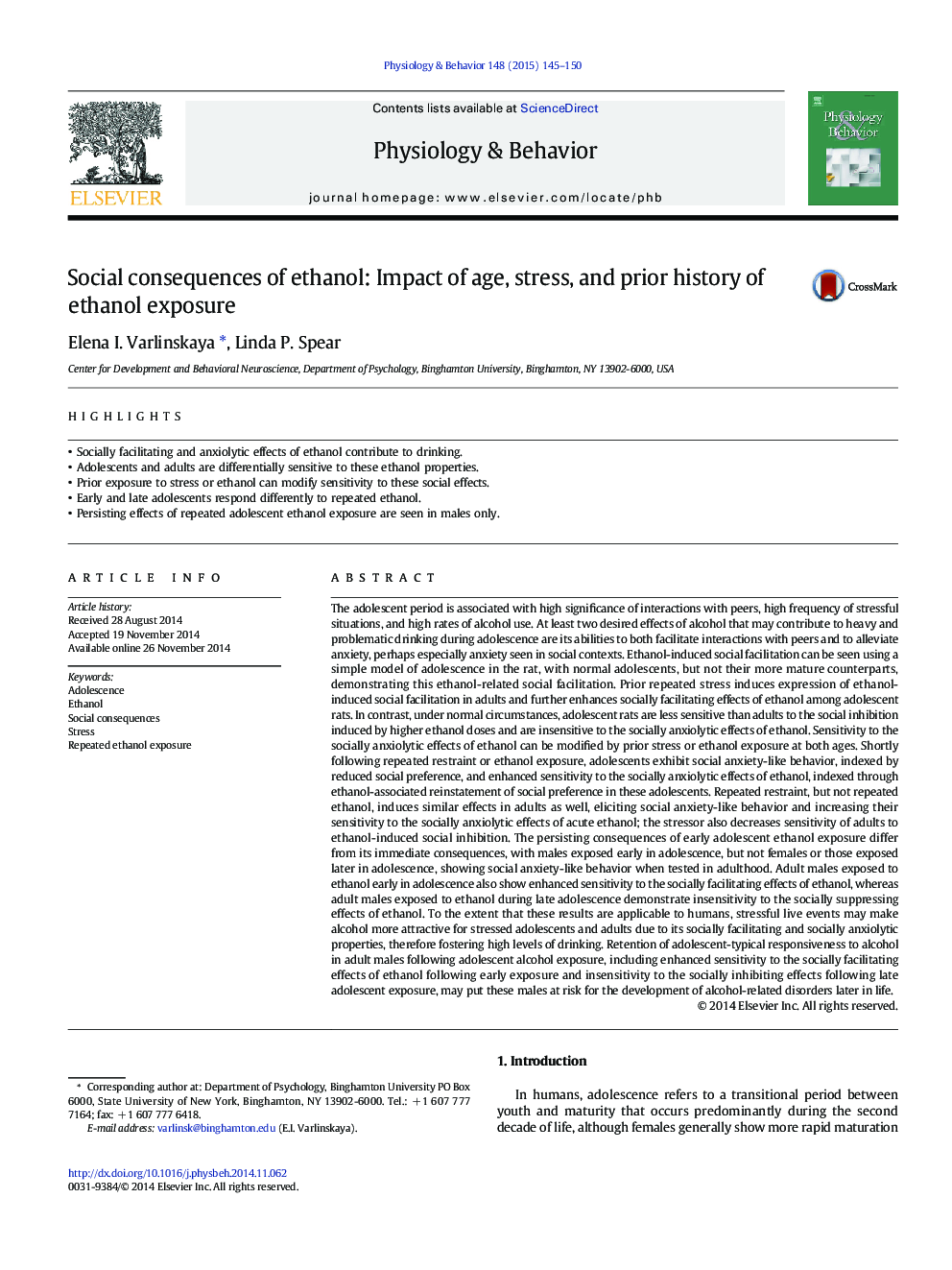| کد مقاله | کد نشریه | سال انتشار | مقاله انگلیسی | نسخه تمام متن |
|---|---|---|---|---|
| 2844103 | 1571169 | 2015 | 6 صفحه PDF | دانلود رایگان |
• Socially facilitating and anxiolytic effects of ethanol contribute to drinking.
• Adolescents and adults are differentially sensitive to these ethanol properties.
• Prior exposure to stress or ethanol can modify sensitivity to these social effects.
• Early and late adolescents respond differently to repeated ethanol.
• Persisting effects of repeated adolescent ethanol exposure are seen in males only.
The adolescent period is associated with high significance of interactions with peers, high frequency of stressful situations, and high rates of alcohol use. At least two desired effects of alcohol that may contribute to heavy and problematic drinking during adolescence are its abilities to both facilitate interactions with peers and to alleviate anxiety, perhaps especially anxiety seen in social contexts. Ethanol-induced social facilitation can be seen using a simple model of adolescence in the rat, with normal adolescents, but not their more mature counterparts, demonstrating this ethanol-related social facilitation. Prior repeated stress induces expression of ethanol-induced social facilitation in adults and further enhances socially facilitating effects of ethanol among adolescent rats. In contrast, under normal circumstances, adolescent rats are less sensitive than adults to the social inhibition induced by higher ethanol doses and are insensitive to the socially anxiolytic effects of ethanol. Sensitivity to the socially anxiolytic effects of ethanol can be modified by prior stress or ethanol exposure at both ages. Shortly following repeated restraint or ethanol exposure, adolescents exhibit social anxiety-like behavior, indexed by reduced social preference, and enhanced sensitivity to the socially anxiolytic effects of ethanol, indexed through ethanol-associated reinstatement of social preference in these adolescents. Repeated restraint, but not repeated ethanol, induces similar effects in adults as well, eliciting social anxiety-like behavior and increasing their sensitivity to the socially anxiolytic effects of acute ethanol; the stressor also decreases sensitivity of adults to ethanol-induced social inhibition. The persisting consequences of early adolescent ethanol exposure differ from its immediate consequences, with males exposed early in adolescence, but not females or those exposed later in adolescence, showing social anxiety-like behavior when tested in adulthood. Adult males exposed to ethanol early in adolescence also show enhanced sensitivity to the socially facilitating effects of ethanol, whereas adult males exposed to ethanol during late adolescence demonstrate insensitivity to the socially suppressing effects of ethanol. To the extent that these results are applicable to humans, stressful live events may make alcohol more attractive for stressed adolescents and adults due to its socially facilitating and socially anxiolytic properties, therefore fostering high levels of drinking. Retention of adolescent-typical responsiveness to alcohol in adult males following adolescent alcohol exposure, including enhanced sensitivity to the socially facilitating effects of ethanol following early exposure and insensitivity to the socially inhibiting effects following late adolescent exposure, may put these males at risk for the development of alcohol-related disorders later in life.
Journal: Physiology & Behavior - Volume 148, 1 September 2015, Pages 145–150
